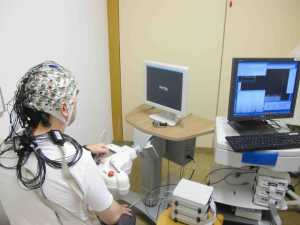23 Jan Robotics Can Be Used To Train Brain To Recover Hand Use After Stroke
MedicalResearch.com Interview with:

The Brain-Machine Interface (BMI) setup applied in this study. Participants imagine opening their hand without actually making any movement while their hand is placed in a device that passively opens and closes their fingers as it receives the necessary input from their brain activity.
Professor Alireza Gharabaghi
Univ.-Prof. Dr. med. Alireza Gharabaghi
Ärztlicher Leiter
Sektion Funktionelle und Restaurative Neurochirurgie
Neurochirurgische Universitätsklinik
Eberhard Karls Universität Tübingen
MedicalResearch.com: What is the background for this study? What are the main findings?
Response: According to the World Health Organization, 15 million people suffer stroke worldwide each year. Of these, 5 million die and another 5 million are permanently disabled. Stroke is the leading cause of serious, long-term disability. About half of all stroke survivors will never be able to use their affected hand for activities of daily living again.
The current study investigates a novel technology which may lead to new therapeutic options for these patients.
MedicalResearch.com: What should readers take away from your report?
Response: When you imagine extending your fingers, while a hand robot contingently opens your hand and a concurrent magnetic pulse stimulates the respective brain area, this combined intervention may recruit additional pathways from the brain to the hand which were not active before.
MedicalResearch.com: What recommendations do you have for future research as a result of this work?
Response: Integrating complementary technologies may strengthen brain circuits qualitatively different and beyond the effects of each of the respective techniques applied separately.
Citations:
Dominic Kraus, Georgios Naros, Robert Guggenberger, Maria Teresa Leão, Ulf Ziemann, Alireza Gharabaghi. Recruitment of additional corticospinal pathways in the human brain with state-dependent paired associative stimulation. The Journal of Neuroscience, 2018; 2893-17 DOI: 10.1523/JNEUROSCI.2893-17.2017
MedicalResearch.com is not a forum for the exchange of personal medical information, advice or the promotion of self-destructive behavior (e.g., eating disorders, suicide). While you may freely discuss your troubles, you should not look to the Website for information or advice on such topics. Instead, we recommend that you talk in person with a trusted medical professional.
The information on MedicalResearch.com is provided for educational purposes only, and is in no way intended to diagnose, cure, or treat any medical or other condition. Always seek the advice of your physician or other qualified health and ask your doctor any questions you may have regarding a medical condition. In addition to all other limitations and disclaimers in this agreement, service provider and its third party providers disclaim any liability or loss in connection with the content provided on this website.
Last Updated on January 23, 2018 by Marie Benz MD FAAD
